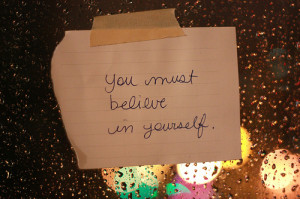Sometimes your goals and behaviors, even though they make rational sense, will come into conflict with the way others would like you to act and live. When this happens, such people may try to make you conform using emotional tools such as sarcasm, criticism, withdrawal of approval, threats or rejection.
The use of such tools by a number of people to exert influence over you is what’s known as social pressure. It’s a force meant to make you conform to the will of others around you and, more broadly, to the standards of society.
I’ve had many conversations with people who’ve made numerous sacrifices in life due to social pressure. Almost without exception, when they look back, they regret having given in to the desires of others instead of doing what they truly wanted to do.
This is why it’s key to know how to deal with social pressure. It frees you to follow your own path in life and do so without any shame. With this in mind, I’d like to give you a few practical ideas:
1. Remember That the Majority Is Often Wrong
Social pressure is often a powerful force because when several people show disapproval towards something we do, we automatically assume they are right and we are wrong, since we are alone and they are many. Our minds tend to operate on the principle that the majority is always correct.
However, in practice, that is frequently not true. In fact, let’s face it: most people don’t really know what they’re talking about most of the time. They believe various ideas simply because they’ve been exposed to them thousands of times from a young age (which is basic indoctrination) and they never bothered to question them; then they go through life following those ideas, living unimpressive lives, and expecting others to do the same.
So when you consider this, it makes no sense to give authority to an idea just because a lot of people believe it. If anything, it’s probably a sign it’s a flawed idea. This is something to always bear in mind when confronted with social pressure.
2. Don’t Blow Things Out Of Proportion
Sometimes social pressure can take pretty rough forms. Like if your whole family threatens to kick you out of the house and disown you unless you get married. It’s not a tragedy, but it’s not a pleasant situation either.
 However, the vast majority of times, social pressure takes light and brief forms. Like if your friends tease you a couple of times when going out for not drinking alcohol, or a few people give you weird looks on the street because you’re dressed in an unusual way.
However, the vast majority of times, social pressure takes light and brief forms. Like if your friends tease you a couple of times when going out for not drinking alcohol, or a few people give you weird looks on the street because you’re dressed in an unusual way.
It’s common though for individuals dealing with such minor events to mentally make a really big deal out of them. They start thinking that everybody hates them, and that they are complete screw-ups. Their minds dramatize and exaggerate.
When dealing with social pressure, it’s important to notice how you think about it, and keep your thinking in check (here is more detailed advice on how to do this). Acknowledge what’s happening, but don’t blow it out of proportions. It will save you a lot of stress.
3. Develop a Strong Sense of Self
In my experience as a confidence and communication coach, there is strong correlation between how sensitive a person is to social pressure and how weak their sense of self is.
People with a weak sense of self let how others see them define them, and abundant approval from others is the one crucial factor that makes them feel good about themselves. Conversely, if others disagree with them or disapprove their conduct, they instantly feel invalidated and worthless.
Cultivating a strong sense of self implies getting to know yourself and your strengths, developing a positive self-image, and improving your social confidence.
This is a big and crucial topic, so I’m not gonna address it in this brief article. Instead, I’ve created a free instructional video where I share my tried and tested advice for improving your confidence and developing a strong sense of self. I suggest you go here and watch it right now. You won’t be disappointed.
4. Find People Who Accept You as You Are
The fact many people don’t approve of what you do or how you do it doesn’t mean that all of humanity is rejecting you. But it can often feel that way; unless there are also people in your life who accept you the way you are.
These people can be either A) like-minded people, who are similar to you in goals and behavior, or B) open-minded people, who have a lot of tolerance towards diversity.
Such people are great because they confirm that being true to yourself is not a death sentence for your social life. It’s reassuring to know that you can follow your path, and even though many will object, some people are fine with it and will keep being your friends.
If you lack such people in your social circle, I encourage you wholeheartedly to find them and keep them close. Get involved in social events, meet new people, get to know them better and spot the ones who accept you as you are. Make friends with such people and foster those friendships. For an unconventional person in particular, they are priceless.
Once you’ve learned to deal with it, social pressure is really no big deal. All that will truly matter to you is that you understand why you wanna do what you wanna do, and it feels right to you.
You’ll feel motivated to follow your own path and you won’t be distracted by herd-like opposition. You’ll live true to yourself and you’ll be proud of yourself for it.
 Sometimes I’ll have an email exchange with someone who’s been socially anxious for over a decade, and although they’ve read a bunch of advice over the years about overcoming this, they’ve yet to take even the first practical step for improving their confidence.
Sometimes I’ll have an email exchange with someone who’s been socially anxious for over a decade, and although they’ve read a bunch of advice over the years about overcoming this, they’ve yet to take even the first practical step for improving their confidence.
 Personally, having coached multiple individuals with anthropophobia and studied a lot of the psychological research on this subject, I consider that multiple causes comes into play, but the most important one concerns negative experiences relating to others.
Personally, having coached multiple individuals with anthropophobia and studied a lot of the psychological research on this subject, I consider that multiple causes comes into play, but the most important one concerns negative experiences relating to others. Also common for people who are needy is a perception of shortage. “If I don’t get this job I will never find another one like it.” “If I don’t get this person to be with me, I will never find anyone like them.” This is how their routine thinking goes.
Also common for people who are needy is a perception of shortage. “If I don’t get this job I will never find another one like it.” “If I don’t get this person to be with me, I will never find anyone like them.” This is how their routine thinking goes. Why is this? Here’s the explanation.
Why is this? Here’s the explanation. Another likely explanation is that some of the people around you have tried to be social with you in the past, but your response was less than welcoming. Maybe you didn’t say much, you answered their questions mostly with two-word statements, and you didn’t appear to enjoy talking to them.
Another likely explanation is that some of the people around you have tried to be social with you in the past, but your response was less than welcoming. Maybe you didn’t say much, you answered their questions mostly with two-word statements, and you didn’t appear to enjoy talking to them. Not being serious about gaining confidence isn’t necessarily a bad thing. Maybe your level of confidence is actually pretty good, and there are just some specific areas where your confidence is a bit lacking. And this lack of confidence isn’t really affecting your life that much, so it’s hard to gather the motivation to do the work required to gain more confidence.
Not being serious about gaining confidence isn’t necessarily a bad thing. Maybe your level of confidence is actually pretty good, and there are just some specific areas where your confidence is a bit lacking. And this lack of confidence isn’t really affecting your life that much, so it’s hard to gather the motivation to do the work required to gain more confidence. A big component of feeling self-conscious is the fact your attention is focused on you. But if you deliberately shift your attention away from you, on other people or on the environment, you’ll immediately begin to relax.
A big component of feeling self-conscious is the fact your attention is focused on you. But if you deliberately shift your attention away from you, on other people or on the environment, you’ll immediately begin to relax.